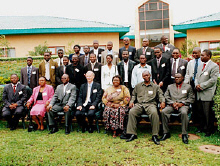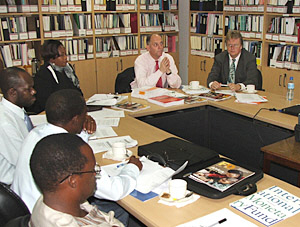The IMF and Civil Society

IMF staff, with a cross-section of staff from Malawian CSOs
Tanzania and Malawi Seminars for Legislators, CSOs, and Media
February 20, 2008
As part of the IMF's continued efforts to enhance dialogue with legislators and civil society organizations (CSOs), seminars were held in January 2008 in Dar es Salaam, Tanzania and Lilongwe, Malawi. The main objective was to exchange views on the Fund's work in Tanzania and Malawi and current economic policy challenges.
Tanzania
A seminar for legislators attracted 21 members of the Budget and Finance Affairs Committee of the Tanzanian parliament in Dar es Salaam, on January 22-23. This was followed by a half-day event targeted at CSOs and the media. Approximately 15 local networks (representing over seventy CSOs) and local media participated. The IMF was represented by senior staff of the African and External Relations departments. The seminar with legislators focused on three main topics:
- How IMF policies and instruments were adapted over time to assist low-income country members; some of the present challenges for the IMF to remain relevant and responsive to the membership's changing needs;
- History of the Funds engagement with Tanzania and lessons learned. Tanzania's current economic policy objectives and challenges and the role of the Fund's Policy Support Instrument (PSI) in addressing them; and
- The budget process in East Africa, with a presentation by Hon. William Okecho, Chairman of the Budget Committee of the Ugandan Parliament.
The seminars were well received by all participants. Dr. Abdallah Kigoda, chairperson of the Budget and Finance Affairs Committee and his deputy, Hon. Adam Malima, said that the Fund was a "friend of the legislators". They acknowledged the Fund's long, positive engagement in the country, which has enabled Tanzania to be categorized as a "mature stabilizer"a country where political and economic institutions are in place and macroeconomic stability is reasonably well established.

Tanzanian CSOs listen to David Robinson (IMF Resident Representative, Tanzania) and Roger Nord (IMF mission chief)
Moreover, parliamentarians said that the cross-country exchange with the Ugandan parliament was relevant and called for more such exchanges of best practices on budgetary issues. Hon. Okecho shared his experience of the budget process in East Africa. He cited the need for increased capacity building in research and data analysis, essential tools for legislators. Both the parliamentarians and CSOs generally welcomed the Fund's role in Tanzania, but asked if the Fund's original goals remained relevant. They underlined the need to maintain an open and regular dialogue.
IMF staff agreed that the current PSI framework for Tanzania provides an opportunity to further intensify dialogue around many of the concerns raised during the seminar including: domestic revenue mobilization, management of natural resources, post-debt relief debt management, financial sector deepening, key determinants of economic growth and poverty reduction, as well as capacity building at local-government level.
Malawi
On January 28, Malawi Resident Representative Maitland MacFarlan and Tilla McAntony of the External Relations Department held a seminar for 35 representatives of CSOs from Lilongwe and across the country. The seminar was also attended by media representatives and was structured around two topics: IMF outreach to civil society; economic development and prospects in Malawi.
Participants welcomed the Fund's role in Malawi and acknowledged improvements in macroeconomic stability under the Fund-supported Poverty Reduction and Growth Facility (PRGF) program. They wanted to know what role CSOs could potentially play in helping the authorities consolidate the economic progress in the country. Underlining the need for regular dialogue with CSOs, they said that the Fund had come a long way and improved its relations with non-governmental stakeholders, including CSOs. They felt, however, that IMF programs are usually based on consultations with too few stakeholders and with too heavy a focus on government and central bank officials.
CSOs called for regular in-country consultations between CSOs and the IMF Resident Representative, visiting missions, as well as between CSOs and government officials. They said that CSOs in Malawi need to enhance their capacity in order to be fully engaged in macroeconomic discussions. Gender consideration should also be part of the capacity enhancement process, they added. CSOs also raised concerns about the availability of information to people at the grassroots level—many stakeholders lack access to the Internet. They stressed that more widespread dissemination of information is required. Maitland MacFarlan noted that most of the documents can be picked up or distributed from the country office.
CSOs noted that the recent strong GDP growth in Malawi had mainly been driven by increased agricultural production emanating from fertilizer and seed subsidies. Other issues of discussion were governance; the sustainability of the future growth of the economy; foreign reserves; reforms at the IMF; and privatization. CSOs also raised the issue of governance at the Fund, saying that Africa's representation was still low. IMF staff highlighted the ongoing institutional reforms discussions as a positive step. IMF staff also noted the recent joint sponsorship of southern CSOs to attend the World Bank and IMF Annual Meetings as an example of relevant cooperation between the two institutions.
IMF staff responded to issues and questions raised by CSOs. They noted that the current PRGF framework provides an opportunity to further intensify such a dialogue around many of the concerns raised during the seminar.
